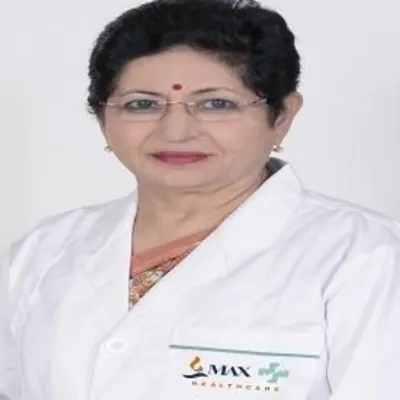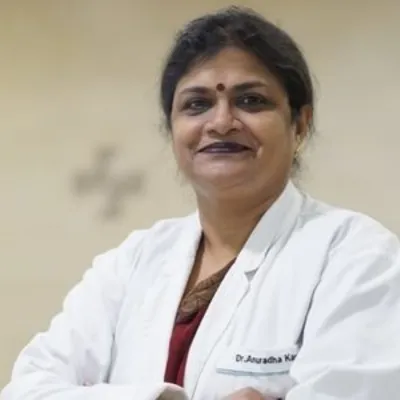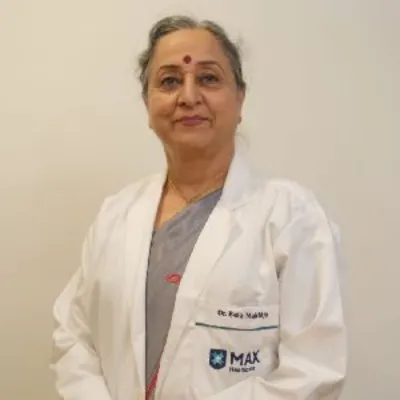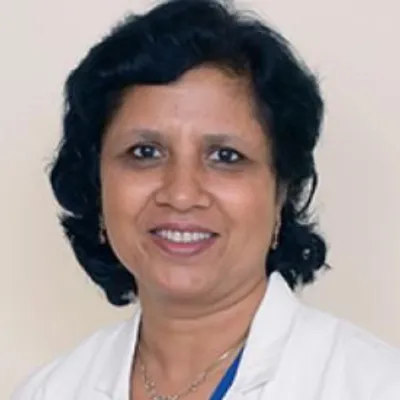Best Liver Transplant Surgeons in Artemis Hospital Gurgaon
 24 December,2025
Read More
24 December,2025
Read More
Enquire now in case of any assistance needed
 21 November,2024
21 November,2024
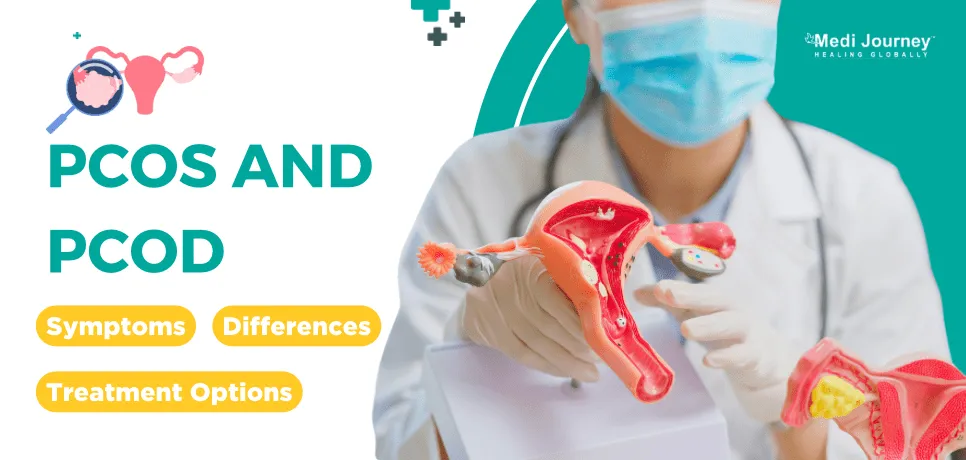
Polycystic Ovary Syndrome (PCOS) and Polycystic Ovary Disease (PCOD) are common hormonal disorders in women. These disorders can significantly impact overall health, fertility, and quality of life. It would be difficult to be unaware of the terms PCOD and PCOS if you are a girl who has come to the age of reproductivity. However, most people don't understand the difference between these terms and often use them interchangeably.
With over 116 million women affected by PCOS, it is our responsibility to educate our readers about the disease and help them make informed decisions. Let's break down what PCOS and PCOD problems are, how they differ, and explore effective ways to manage them.
Fill up the form and get assured assitance within 24 hrs!
The full form of PCOS is polycystic ovary syndrome. It is a common hormonal disorder that impacts a woman's reproductive system, particularly affecting the ovaries' ability to function as they normally would. Here's a closer breakdown of how PCOS impacts the body:
Ovarian Hormones:
Ovulation and Hormonal Control:
Follicles and Cysts:
Impact on Hormone Levels:
PCOS is a metabolic disorder affecting women of reproductive age (12 to 51). It may also lead to other health concerns, like insulin resistance, obesity, and skin conditions. PCOS can present differently in individuals, and understanding its specific type is crucial for effective management. Here's a concise overview of the seven primary types of PCOS and their treatment approaches:
1. Insulin-Resistant PCOS: In insulin-resistant PCOS, the body cells become resistant to insulin, leading to abnormally high amounts of glucose in the blood. It further leads to increased androgen production and disrupts hormonal balance. Insulin-resistant PCOS is the most common type of PCOS, responsible for over 70% of cases.
2. Lean PCOS: Lean polycystic ovarian syndrome affects women who are of normal weight or are underweight. It leads to hormonal imbalances and irregular periods.
3. Inflammatory PCOS: In women with PCOS, chronic low-grade inflammation can worsen insulin resistance and disrupt hormonal balance. An increased thyroid level, decreased vitamin D levels, and abnormal blood count levels can indicate this type of PCOS.
4. Hidden-Cause PCOS: When the exact reason for PCOS is not readily apparent, it is known as hidden-cause PCOS. It can be multifactorial, potentially genetic, or environmental.
5. Pill-Induced PCOS or Post-Pill PCOS: Women taking birth control pills often fear developing PCOS. While hormonal pills do not cause PCOS, suddenly stopping them could temporarily lead to irregular periods and other PCOS-related symptoms. It is reversible and gets resolved within months after the pills are withdrawn.
6. Adrenal PCOS: Around 10% of PCOS cases are caused by abnormal stress response and excessive androgen production by the adrenal glands. In adrenal PCOS, the levels of androgen DHEA-S are elevated, while testosterone remains normal.
7. Post-Pregnancy PCOS: Mothers can develop postpartum PCOS after giving birth. This is due to hormonal imbalances during and after pregnancy.
Some researchers suggest categorizing PCOS based on symptom patterns and hormone profiles, which can provide a more specific framework for understanding and managing the condition. Here's a breakdown of the four proposed types of PCOS based on these criteria:
PCOD (Polycystic Ovary Disease) is similar to PCOS in that it involves multiple small cysts on the ovaries. However, PCOD is often viewed as less severe and more manageable with lifestyle changes.
While PCOS and PCOD are related conditions that significantly affect women’s health, they still have some distinct features. Learning about the differences between the two can help navigate the treatment journey better.
As mentioned earlier, PCOD and PCOS are related conditions impacting the ovaries in women, but they have notable distinctions in symptoms, severity, causes, and treatment. Here’s a comprehensive look at the differences:
|
Feature |
PCOD |
PCOS |
|
Definition |
Ovaries produce immature eggs, forming cysts. |
Metabolic syndrome with high androgen levels, resulting in cysts. |
|
Prevalence |
Common (affects 1 in 3 women globally). |
Less common (8% to 13% of women). |
|
Hormone Levels |
Mild hormonal imbalance, no significant increase in androgens. |
High androgens cause pronounced symptoms. |
|
Menstrual Issues |
Infrequent/absent periods. |
Irregular or heavy periods. |
|
Impact on Fertility |
Minimal impact; most women can conceive. |
Affects fertility; ovulation irregularities. |
|
Health Complications |
Rare; few complications. |
High risk of diabetes, heart disease, and certain cancers. |
|
Symptoms |
Mild to moderate; less frequent. |
Severe, begins at a younger age. |
|
Management |
Lifestyle changes, diet, exercise. |
Lifestyle, medications, and sometimes hormone therapy. |
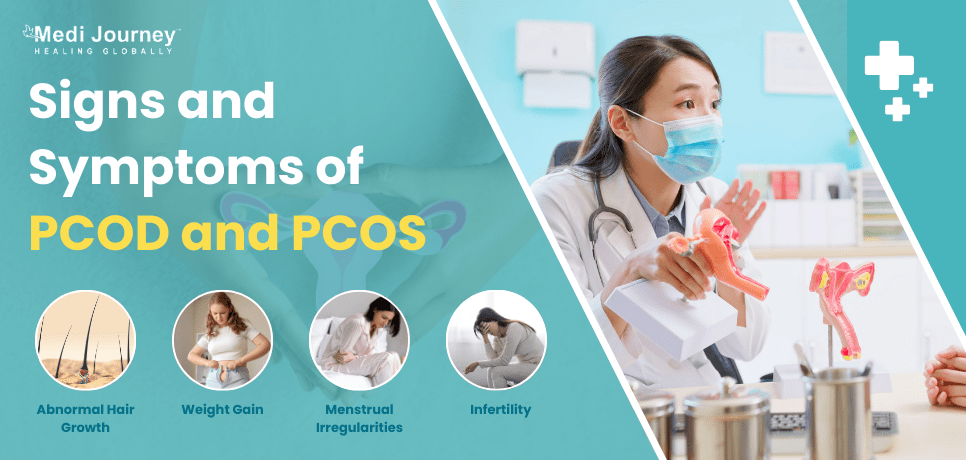
PCOS is not a singular disease but a syndrome—a collection of symptoms that varies widely from person to person. Its effects can change throughout a woman's life, making individualized diagnosis and treatment critical for effective management. Here's a detailed overview of how it manifests and progresses across different stages of life:
Some women begin experiencing symptoms as early as their first menstrual cycle (menarche). Others may only notice signs after significant weight gain or struggles with fertility.
Common symptoms shared by both PCOS and PCOD include:
The exact causes of PCOD and PCOS are unknown. However, researchers have attributed several factors that can lead to these conditions.
There is no single way of diagnosing PCOS or PCOD. Doctors run multiple tests to determine whether you have these disorders and rule out other causes of symptoms. Common tests to diagnose PCOD/PCOS are:
To confirm the diagnosis of PCOD or PCOS, patients must have at least two of the following symptoms:
PCOS does not have any curative treatment. Instead, doctors use various approaches to manage symptoms effectively. The treatment plan is also determined based on whether you want to get pregnant or not. Medications used for treating PCOS are:
There is no permanent cure for PCOD or PCOS as of now. While the disorders can be managed with medications, weight management, dietary changes, and exercise, curing them permanently is not possible due to genetic links.
PCOS is more severe than PCOD, causing fertility problems in 70 - 80% of the women. However, with proper treatment, pregnancy is possible for women suffering from PCOS. The treatment plan includes:
The best age to get pregnant with PCOS is before 30. By monitoring ovulation and using assisted reproductive techniques, women can conceive up to 37 to 40 years of age. Chances of successful pregnancy decrease steeply after the age of 40. Hence, it is necessary to start early if you suffer from PCOS and wish to get pregnant.
PCOS can affect women of any age. The treatment options depend on the individual's choice of getting pregnant in the future or not. For unmarried women with PCOS, treatment focuses on symptom management, hormonal regulation, and preventive measures.
PCOS treatment for unmarried women includes hormonal birth control, progestin therapy, lifestyle adjustments, and medications like antiandrogen and metformin. Lifestyle changes such as eating a balanced diet, losing weight, and exercising can help treat PCOS symptoms in young unmarried girls.
Hormones play an important role in the development of cancer. Women with PCOS have high estrogen levels and have 3 times higher chances of developing endometrial cancer. PCOS also increases the risk of ovarian cancer by 2 to 3 times. Other cancers associated with polycystic ovarian syndrome are uterine, breast, endocrine, kidney, and bone cancer.
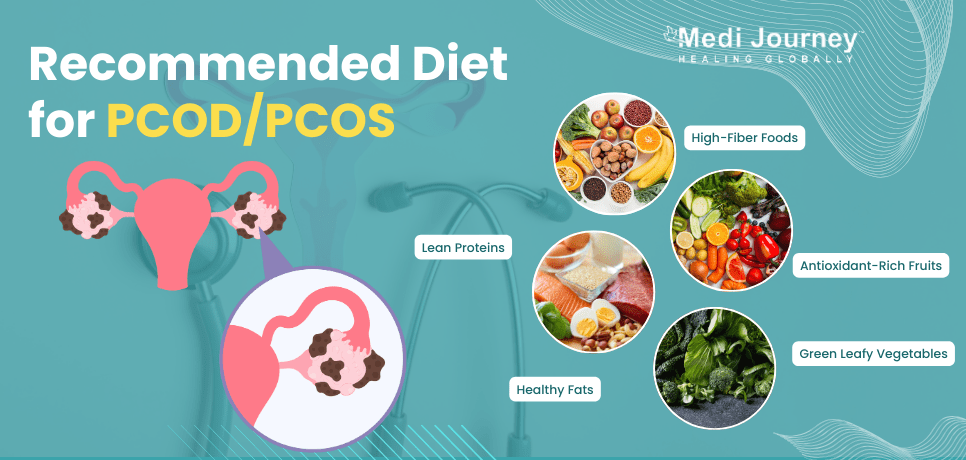
Diet plays an important role in the nonpharmacological treatment of PCOS and PCOD problems. Having a proper PCOS diet will help in
Women suffering from PCOD/PCOS should consume a diet rich in -
A few items that PCOD/PCOS patients should limit or avoid are -
Lifestyle changes significantly help in managing polycystic ovary syndrome. These include:
PCOD and PCOS have psychological effects on affected women. Both disorders negatively impact mental health. Common aspects associated with PCOS and PCOD are:
PCOS and PCOD require proactive management, as they affect more than just reproductive health. With the right approach, many women manage to control symptoms and lead healthy lives. A combination of medical guidance, dietary changes, exercise, and mental health support can make a substantial difference. If you or someone you know is struggling with symptoms, consult a healthcare provider for an individualized approach to management.
Fill up the form and get assured assitance within 24 hrs!
Doctor of Pharmacy
Dr. Deepanshu Siwach is a skilled clinical pharmacist with a Doctor of Pharmacy degree.?He has 4+?years of experience and has worked with thousands of patients. He has been associated with some of the top hospitals, such as Artemis Gurgaon.
Dr. Parul Katiyar is a renowned and experienced IVF Specialist with an experience of 21 years. Her expertise encompasses a wide range of areas including PCOS, Reproductive Endocrine disorders, Male infertility, Endometriosis, Fertility Preservation, ICSI...
Senior Consultant
Medical Oncologist
Nanavati Super Specialty Hospital, Mumbai
WhatsApp UsSenior Director
Gynecologist and Obstetrician, IVF Specialist
Max Super Speciality Hospital, Shalimar Bagh, New Delhi
WhatsApp UsSenior Director
Gynecologist and Obstetrician, IVF Specialist
Max Smart Super Speciality Hospital, Saket, New Delhi
WhatsApp UsSenior Director
Gynecologist and Obstetrician
Max Smart Super Speciality Hospital, Saket, New Delhi
WhatsApp UsSenior Director
Gynecologist and Obstetrician
Max Smart Super Speciality Hospital, Saket, New Delhi
WhatsApp UsSenior Director
Gynecologist and Obstetrician
Max Smart Super Speciality Hospital, Saket, New Delhi
WhatsApp UsThe Art of Effective Communication
 24 December,2025
Read More
24 December,2025
Read More
 23 December,2025
Read More
23 December,2025
Read More
 17 December,2025
Read More
17 December,2025
Read More
 16 December,2025
Read More
16 December,2025
Read More
 10 December,2025
Read More
10 December,2025
Read More
 09 December,2025
Read More
09 December,2025
Read More
Trusted by Patients
"I am Asim from Bangladesh and was looking for treatment in India for neuro. I visited many websites to get the complete information regarding the treatment but I was not satisfied as I was getting confused. In the meanwhile, one of my friends suggested I seek help from Medi Journey as he experienced his medical journey very smoothly and was satisfied with it. They have filtered the top 10 doctors as per experience, the success rate of surgery & profile, so it helps us to choose the best treatment in India. "
"For my knee surgery, Medi Journey guided me to BLK Hospital where I received exceptional care. The team's support and the expertise at BLK Hospital exceeded my expectations. Thank you Medi Journey for making my medical journey stress-free. "
"I came from Iraq for my granddaughter's eye surgery in India facilitated by Medi Journey, due to critical cases they advised us to get a second opinion from the different hospitals before going to surgery. Finally, we went to Fortis Escort Hospital, which helped us to get more confidence for diagnosis. Fortis Escort Hospital has the best eye surgeon team with the latest instruments. Thanks to all team members for providing a high-quality treatment in India at an affordable cost. "
"I came for my hair transplant in India, before coming I was so confused about choosing the best clinic and surgeon for me. But thanks to God one of my friends had a hair transplant in India through Medi Journey. He recommended me to go with them. I am completely happy with my experience with them. They were always very fast in their responses to me. the success rate of my hair transplant surgery is 100%."
"Artemis Hospital, suggested by Medi Journey, turned out to be a great choice for my treatment. The personalized assistance and medical care were exceptional. I'm grateful to Medi Journey for guiding me to a hospital that perfectly matched my needs. Highly recommended! "
"I came from Afghanistan for my treatment in India at Jaypee Hospital, Noida. I had a fantastic experience with Medi Journey. Kudos to them for their incredible support during my medical journey. They not only took care of all the logistics but also connected me with a fantastic healthcare team. Efficient, caring, and highly recommended for a hassle-free medical tourism experience."
"I am Adam from Kano, Nigeria, one of my friends from Nigeria was facilitated by Medi Journey, and he recommended us to go with them. I sent my all reports to them and within 48 hours they reverted with 4 options from different hospitals. They helped me to get a Visa letter from the hospital, arrange pick-up from the airport, and book a hotel for me. Their team is very honest and throughout our stay in India they are with us they are caring for us like his family members. BLK Hospital is the best hospital in India with a top surgical oncologist surgeon team, a very advanced OT, and a Radiotherapy department. I wish more success to Medi Journey. "
"Great experience at the Max Hospital for my spine surgery and was successfully done. I thank my neurosurgeon and his entire team. I recommended all of my country's people to Medi Journey for treatment in India, they choose the best hospital, the best doctors, and the best cost for patients."
"I came to India from Dhaka, Bangladesh for my father-in-law's cardiac surgery at Fortis Hospital. I was confused about choosing the best surgeon for him before coming, but their team helped me to choose the best hospital and best cardiac surgeon in India with very good cost and 100% success rate of surgery. I am very happy with the services, really they make my journey so comfortable that make me feel at home. Thanks again and I like people to choose "Medi Journey" as your travel guide. "
"I am Mohammad from Bangladesh came to India for my general health checkup. Medi Journey offers me the complete package including Pick-up from the airport, hotel services, and 24-hour assistance. They guide you to choose the best hospital in India, the best cost of treatment with top-most doctors and give you complete information about hotel booking, and pick-up from the airport before coming to India They have the best team to help. Always choose Medi Journey for your treatment in India."

